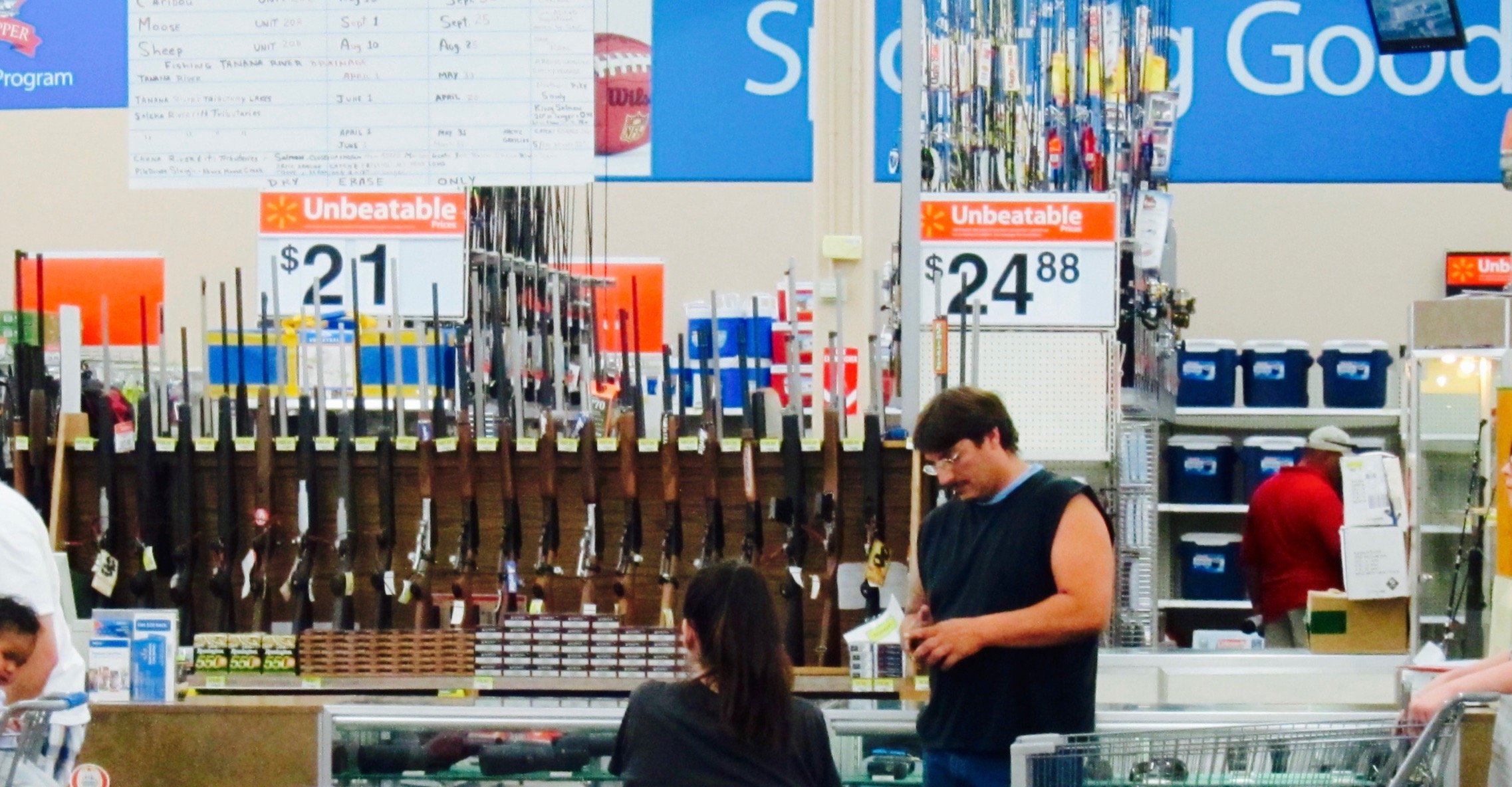Last week, FBI director James Comey admitted that alleged Charleston church shooter Dylann Roof obtained a gun by exploiting a loophole in the National Instant Criminal Background Check System, or NICS. Through what’s known as a “default proceed,” Roof was able to purchase a gun even though the system had not issued a determination on his background check by the end of a federally mandated waiting period of three business days. While federal law allows such sales, there’s one major organization that has implemented tougher protocols to ensure guns don’t end up in the wrong hands: Walmart.
Current federal guidelines offer dealers a degree of discretion in the small percentage of cases where background checks don’t clear within two hours and are placed under review, after which many retailers will opt to proceed with the sale even if an approval or denial hasn’t been issued when the three-day mark passes. Walmart’s own background check policies have surpassed federal requirements since 2002, when the company decided that it would no longer sell guns to customers without a completed approval from NICS. The company refuses to sell a gun without a concrete all-clear from the federal system.
“The fact is, a gun dealer is not required to sell a gun to anybody,” Jonathan Lowy, director of the Legal Action Project of the Brady Center to Prevent Gun Violence, tells The Trace. In default proceed sales, he argues, it’s safer not to. In a 2000 FBI study, the agency found that a person whose background check takes over 24 hours to complete is also 20 times more likely to be a prohibited purchaser. “Walmart realized that it’s just not good practice as a responsible corporate citizen to supply guns to those people,” says Lowy.
Walmart, the nation’s largest gun retailer, sells rifles, shotguns, and ammunition in some 1,700 outlets. (It doesn’t offer handguns, except in the state of Alaska.) In 2008, the company adopted even more rigorous standards by implementing a 10-point code of conduct as part of a partnership with the gun safety group Mayors Against Illegal Guns. In addition to refusing default proceed sales, Walmart agreed to videotape all firearm transactions, require background checks for all employees handling or selling guns, and create a system to trace guns sold by the company that are later linked to crimes, among other measures. (Mayors Against Illegal Guns is an earlier iteration of Everytown for Gun Safety, a seed donor of The Trace.)
While some gun safety groups predicted that Walmart would set an industry standard, that’s not quite what’s happened. Some major retailers like Sports Authority and Gander Mountain have also implemented “don’t know, don’t sell policies.” But others, such as Cabela’s, have not. Currently, Walmart is the only big-box retailer to adopt the voluntary code, called the Responsible Firearms Retailer Partnership, and its policies have little influence on the thousands of independent gun stores across the U.S.
“There’s not really an effect on small dealers,” Ron Godwin, a gun dealer in California who served on the board of directors for the former California Association of Firearms Retailers, tells The Trace. “Walmart’s going to do whatever they feel they need to do for their bottom line.”
But evidence shows that Walmart’s 10-point plan can work for other gun retailers as well. In 2006, 27 gun dealers were sued by New York City for violating federal laws on firearm sales and for selling guns that were later tracked to crimes committed in the city. As part of a settlement, 24 of the dealers agreed to enforce a code of conduct almost identical to Walmart’s. A 2013 study by the Center for Gun Policy and Research at Johns Hopkins Bloomberg School of Public Health found that the policy reduced the flow of crime guns from those dealers by 84 percent.
Critics also argue that implementing stricter firearm sales policies could hurt retailers’ profits. But according to Brian Nick, a spokesperson for Walmart, the measures didn’t hurt the company’s gun sales, though he wouldn’t discuss specific sales numbers. Lowy adds that Walmart’s ability to quickly implement the policies proves that other dealers could do the same.
“Walmart was able to institute this common-sense reform within a matter of days,” he says. “If the biggest retailer in the world can do it, pretty much at the snap of their fingers, it shows that any other gun dealer in America could easily do the same thing.”
[Photo: Flickr user Rick Webb]

